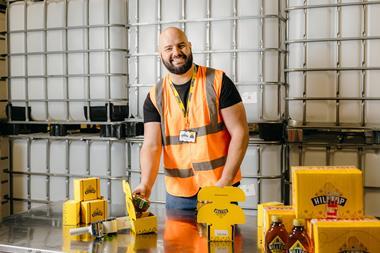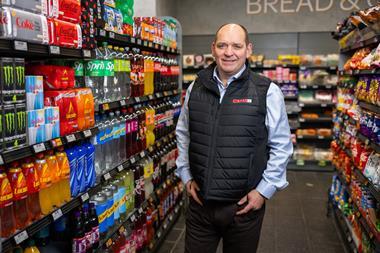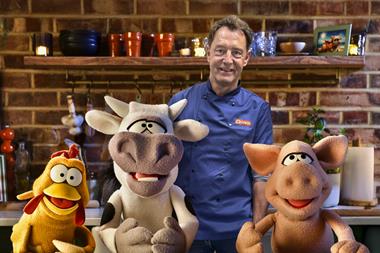snapshot
Age: 55
Place of birth: Ripon, Yorkshire
Marital status: Married, with two sons
Employment history: 17 years at Premier Foods, followed by time at Symington’s and as a consultant
Best career decision: Joining Poundstretcher. How many businesses do you join where if you wake up and don’t see double-digit growth you’re disappointed?
Worst career decision: As long you’re learning as you go, you never make a bad decision
Best advice received: Seek forgiveness, not permission
Business mantra: Lead from the front
Business idol: There are lots of people you can learn from in business, so for me it’s not one, but lots of different people
Hobbies: The traditional ones - sport and watching sport
Death row meal: Yorkshire fish and chips
Reading: Max Hastings - The Korean War
Favourite film: Anything with Tom Hanks in it
Favourite musician: Jimmy Page
Imagine waking up to the disappointment of “only” high single rather than double-digit sales growth. It’s not a sensation many in the grocery industry will recognise right now - indeed for most any growth would be a bonus right now - but for Ian York, this is as bad as it gets.
Why? Because York has taken the helm at Poundstretcher, just as one of the UK’s original discounters is making a comeback. It reported a 9.1% like-for-like sales hike for the month of January, although momentum has been building for some time: pre-tax profits of £1.35m to 31 March 2014 represented a significant turnaround on the £3.69m loss the year before.
Still, that’s not to say York’s job is easy. It’s one hell of a metaphorical baby to drop. And this is also York’s first shot at running a company, and his first experience as a retailer. He previously spent 17 years at Premier Foods, rising to commercial director, before leaving in 2011 as its performance unravelled. After a brief spell in consultancy, he joined Symington’s in March 2013.
But this is definitely a stretching exercise for York. He’s responsible for 409 stores and 6,000 employees. And to borrow from Morrisons chairman Andy Higginson’s lexicon, he’s still wearing the L-plates.
So what’s he been up to? And what is he planning? Although York was officially announced as managing director in October, he arrived in August to learn the ropes. And one aspect he won’t be changing is its grocery offer. Food makes up 50% of Poundstretcher’s products and about 50% of sales.
“Food is a main footfall driver,” says York. “People see brands they know at price points they don’t recognise. That excites them and brings them into the store.”
Poundstretcher only sells ambient products, with the exception of approximately 140 stores that also sell bread and milk. York says he intends to keep it that way, even though competitors such as Poundland sell a variety of chilled food.
“We have enough to do with the ranges we have,” he says. “We’re opening bigger and bigger warehouses, so who knows what might happen in the future, but we have no plans for fresh or frozen food.”
So rather than expanding the range, York is focusing on the prices. The retailer cut “over 100” to bring an existing range of everyday products such as cereal and toothpaste down to 49p in January, but doesn’t intend to make any further price cuts - he says he’s already undercutting his rivals. “Our Cadbury’s Fingers are 79p. Tesco have just made a fuss about dropping theirs to 80p… come on boys!”
And it’s not just the big four York is confident about beating. Last month, Poundstretcher published a series of ads showing that across a 22-item grocery shop, Poundstretcher’s branded goods were 25% cheaper than Lidl’s private label and 19% cheaper than Aldi’s.
“Our Cadbury’s Fingers are 79p. Tesco have just made a fuss about dropping theirs to 80p… come on boys!”
Still, not everything is rosy. York knows that one of the big problems facing Poundstretcher is its reputation for cramped stores. As one of the older discounting brands, Poundstretcher had many small high street units with narrow aisles and the air of a jumble sale.
To address this, it began upgrading the estate in 2012 with a plan to modernise over 50% of its stores by widening aisles, decluttering shop floors and cutting product ranges. It appears to be working.
Sales are up by 20%-30% in the 40 stores revamped so far and York credits the additional space with helping to drive festive sales - Poundstretcher enjoyed its most successful Christmas ever, recording a sales uplift of 10.4% for the five weeks to 30 December.
“The most important thing is shops and customers,” he says. “It’s very, very simple. Focus on what the customer needs and keep stores simple. We might not always have done that in the past.”
A better environment to shop in
It’s doing it now, though. A further 93 stores will be overhauled by the end of March. York is also closing 20 stores, leaving behind units that are 5,000 to 7,000 sq ft to move into new 12,000 to 15,000 sq ft shops in the same areas to cope with the increased consumer interest in discount formats.
“The most important thing I’ve got to do is improve the stores and make them a better environment to shop in,” he says. “We’re even looking at our top stores and thinking ‘how can we do better?’ We’re trying to get to where our competitors are.”
That competition is not Poundland, or any of the other single-price retailers, insists York. Instead he has set his sights on the variety discounters like B&M and Home Bargains, as well as Aldi and Lidl, which he describes as “mighty, powerful competitors. And I need to nick customers from them.”
He praises what Aldi and Lidl have achieved in terms of market share, and would like “a bit of it, not a lot. A little bit of their share is big for my business. And I’m only small, so I’ve got loads of room to grow.”
York has set a target of 13% year on year and is aiming to hit sales of £520m this year. And he’s confident he can do it, insisting that the discount channel is a few years away from being a crowded market.
“I don’t think discounting will suddenly go away as the economy improves and people start to feel better off,” he says.
“The British public has fundamentally changed. Discounting must have a glass ceiling but I think we’ve got a long way to go before we get to that point. We’re about two or three years away from worrying about there not being enough room in the market.”
Which should give him plenty of time to turn that pesky single digit into the two he craves.













No comments yet